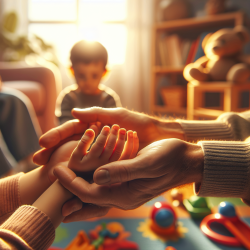The journey of recovery for children surviving severe malaria is fraught with challenges, particularly concerning their mental health. A recent study titled "Use of the creating opportunities for parent empowerment programme to decrease mental health problems in Ugandan children surviving severe malaria: a randomized controlled trial" sheds light on the potential of behavioral interventions to mitigate these challenges. This blog aims to provide practitioners with insights into enhancing their skills by implementing the outcomes of this research or by encouraging further exploration in this field.
The Study and Its Findings
This randomized controlled trial was conducted at Naguru Hospital in Kampala, Uganda, between January 2018 and July 2019. It involved 120 caregiver-child dyads with children aged between 1.45 to 4.89 years. The study aimed to assess the impact of a behavioral intervention on the mental health outcomes of children six months after discharge from severe malaria treatment.
Participants were divided into two groups: a control group receiving psycho-educational support and an intervention group receiving a behavioral program based on the Creating Opportunities for Parent Empowerment (COPE) model. Despite the intervention's structured approach, results showed no significant difference in mental health outcomes between the two groups at the six-month follow-up.
Implications for Practitioners
The findings of this study highlight several key considerations for practitioners:
- Understanding Contextual Differences: The COPE model, originally developed in a different cultural and healthcare setting, may require further adaptation to be effective in resource-limited environments like Uganda.
- Longer Follow-Up Needed: The six-month follow-up period might have been insufficient to capture the full impact of the intervention. Practitioners should consider longer-term assessments when evaluating similar programs.
- Role of Caregiver Mental Health: The study found associations between caregiver depression and child behavioral problems during admission. Addressing caregiver mental health may be crucial in improving child outcomes.
- Disease-Specific Interventions: Malaria's unique impact on behavior suggests that interventions tailored specifically for post-malaria recovery could be more beneficial.
Encouraging Further Research
The study underscores the need for continued research into effective interventions for improving mental health outcomes in children post-severe malaria. Practitioners are encouraged to explore:
- Cultural Adaptation: How can existing models like COPE be tailored to fit different cultural contexts?
- Extended Evaluation Periods: What are the long-term effects of behavioral interventions on child and caregiver mental health?
- Integrated Approaches: How can behavioral interventions be combined with medical treatments to enhance recovery?
The quest for effective interventions is ongoing, and practitioners play a pivotal role in shaping future strategies through both implementation and research.
To read the original research paper, please follow this link: Use of the creating opportunities for parent empowerment programme to decrease mental health problems in Ugandan children surviving severe malaria: a randomized controlled trial.










